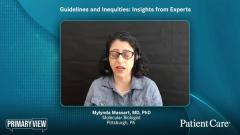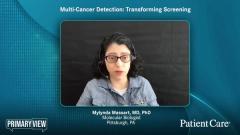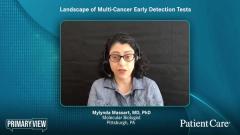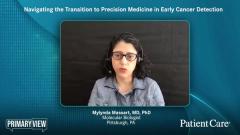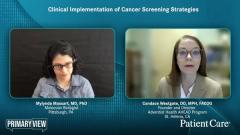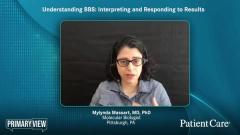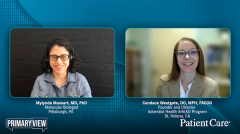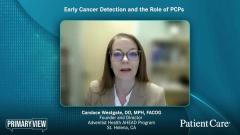
The Future of Multi-Cancer Early Detection
To close this series, experts explore the challenges and guideline gaps in multi-cancer early detection while considering its potential impact on patient care, accessibility, and improved outcomes.
Episodes in this series

Transcript
Candace Westgate, DO, MPH, FACOG: Let’s take a step back now….So we know it’s new, we know it’s emerging, and there’s no societal guidelines on when and how to utilize these tests for cancer screening in our general population. So what areas do you feel require more exploration or research in the context of multi-cancer early detection? And then tell me what you think the landscape of this is going to look like in the next 5 to 10 years.
Mylynda Massart, MD, PhD: So this is difficult. I don’t think we’ll have guidelines for quite a while. Guidelines typically take ten years to develop. And so I think we’re going to be sort of on our own for a while. And the biggest question that gets asked of me is how frequently do we repeat this [screening]? We kind of have intervals for our other types of screening, but even for those, all the guidelines don’t agree on the age and the intervals and the frequency. I think, again, I really take this back to precision medicine and think about that individual patient and their pretest probability if someone is higher risk. You know, they are over 50 and they have a hereditary cancer mutation or they’re over 50 and they are a cancer survivor. I might be thinking about a more frequent interval of screening. And if someone is lower risk, they’re over 50, but that’s their only risk factor, I might think about spreading out their screening, and that’s going to take some time. And again, that real-world data that we need to capture to truly understand and generate these types of guidelines. So I think that there’s some critical research that needs to occur around the interval and the frequency. And then I think there’s also really important research that needs to be demonstrated with the real-world trials that are happening now. This is all based on this assumption that if we can stage-shift and catch cancer earlier, we are actually going to save lives, and improve quality-of-life years, and save dollars. We now need to actually show that. We need to show it. We really want to believe that we’re doing this. So even though we’re in this era of precision medicine, we still need best evidence that this is actually serving the purpose that it was intended to serve. Because, of course, we’re talking about adding a screen which has cost to other screening that already has a significant societal cost. But we want to know that that is worth it. So that data, I think, is something that’s critical. I think it’s important to say that there are some really exciting trials currently in place that I think will contribute to this data. One is in the National Health Service in the UK and it’s a massive trial around multi-cancer early detection and it’s a prospective trial. I’m hoping in the next year we’re going to start to see some of the preliminary data come out of there. I have a feeling it’s going to be very positive. And then the US is also going to undertake, under the Moonshot funding, a Vanguard series of studies through the National Cancer Institute. I don’t think we know too much detail yet about what that’s going to look like, but I think that’s also going to help establish some of the data independent of the companies themselves and the research that they have done thus far to help generate guidelines. But most importantly, I think we need to get to the place where we can get this approved in insurance universally for everyone. You mentioned earlier the access issue. I am very passionate about emerging technology and it reaching actually those who need it the most, which is typically not those who can afford it. And it is a $950 test out of pocket right now if it’s not covered by insurance or reimbursed through a flexible medical spending account. And that’s a significant barrier for actually the large majority of my patients. So while I started this off saying how patients have been wanting this test forever and they’re so excited and they get it right away because they’ve always known this should exist, that cost is a real barrier and we need to be able to equitably bring this to everyone.
Candace Westgate, DO, MPH, FACOG: Thank you so much for your time today. It’s been great dialoging with you and exploring more this new field of multi-cancer early detection. I appreciate all of your insight. Any last remaining remarks for our viewers? Maybe someone who’s interested in this and doesn’t quite know whether they should consider this for their patients—what would you say to them right now?
Mylynda Massart, MD, PhD: I would say it’s definitely worth investigating. I would consider contacting a local representative to get more data and some of the research to review it yourself personally. But I think that it’s very appropriate to start considering offering this in your clinics.
Transcript was AI-generated and edited for clarity.
Newsletter
Enhance your clinical practice with the Patient Care newsletter, offering the latest evidence-based guidelines, diagnostic insights, and treatment strategies for primary care physicians.

